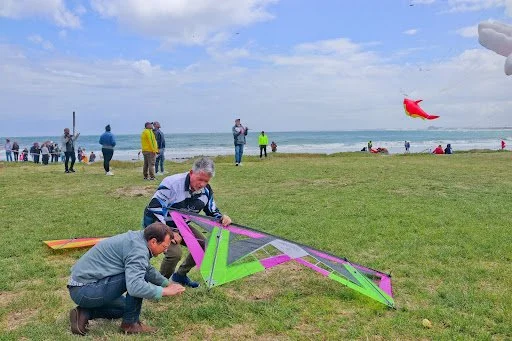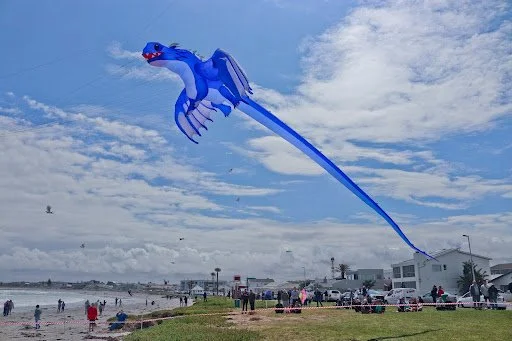The Sky’s the Limit! A Kite Festival Celebrates Mental Health Awareness in South Africa
Visitors of the annual International Cape Town Kite Festival watch their kites soar. (Sulize Terreblanche)
Colorful kites took over the skies on October 27, 2024 during the Cape Town International Kite Festival, an annual mental health awareness celebration.
Cape Town celebrated its 30th annual International Kite Festival, the oldest of its kind in South Africa. What started as a small, one-day event to fly kites now boasts an international following with pop-ups all over the world and dozens of activities, including kite making and games centered around well-being. In a statement provided by Barbara Meyer, Communications Manager of Cape Mental Health, over 25,000 visitors have come to the event in the past. Kids, adults, and even professional kite fliers traveled from all over South Africa to celebrate. Tourists from other parts of Africa, Italy, Germany, Bulgaria, and even the United States flew to Cape Town to take part in the magic.
Kites big and small, simple and complex, soared up on October 26. Visitors marveled at blue dragons, green jellyfish, and even a hand that waved back to the crowds below.
October is Mental Health Awareness Month in South Africa. The Cape Town International Kite Festival is a celebration of “freedom, creativity, and joy.” As vibrant colors fill the air, children and adults alike watch their kite—and spirits—soar. Every year, it raises funds for Cape Mental Health, a nonprofit organization that provides free counseling to South African communities, especially vulnerable youth. Founded in 1913, Cape Mental Health is the oldest mental health organization in South Africa and a founding member of the World Federation for Mental Health. The kite festival is only one of 24 other projects, including initiatives for people with psychosocial and intellectual disabilities, sexual assault survivors, and anyone working on their mental health.
The Cape Town International Kite Festival promotes open dialogues around mental health and mental well-being. In the statement provided by Meyer, CEO Ingrid Daniels reflected, “Mental health matters and mental health conditions are more common than we realise. […] The event allows artists, mental health ambassadors, staff, mental health care users, volunteers and anyone to share their stories of pain, healing and recovery. Every conversation that matters chips away at stigma. Each tug of a string is a reminder of the strength and resilience within us all. Together, we can lift one another up and paint the world with vibrant hues of hope and possibility.”
Here at Georgetown, students can take care of their mental health by participating in clubs, staying active, and taking time for themselves. Students can enjoy university traditions like Traditions Day, Homecoming, Fall Fest, and Georgetown Day or even just a movie night with friends. Dr. Shanice Anderson, a staff psychologist at the Counseling and Psychiatric Services (CAPS) explains that what’s important is “Finding spaces and activities that feel good for them, whether is movement through dance or getting creative at the Maker Hub; tapping into the places, spaces, and activities that allow them to pause in the midst of the busy academic year and give themselves the opportunity to recharge. And if this is something they have never done or are struggling to figure out, that’s what we, at CAPS, and the other campus resources are here for.”





